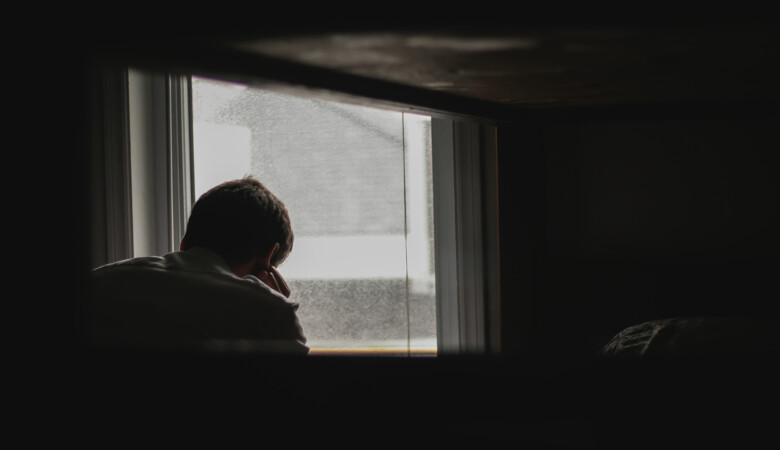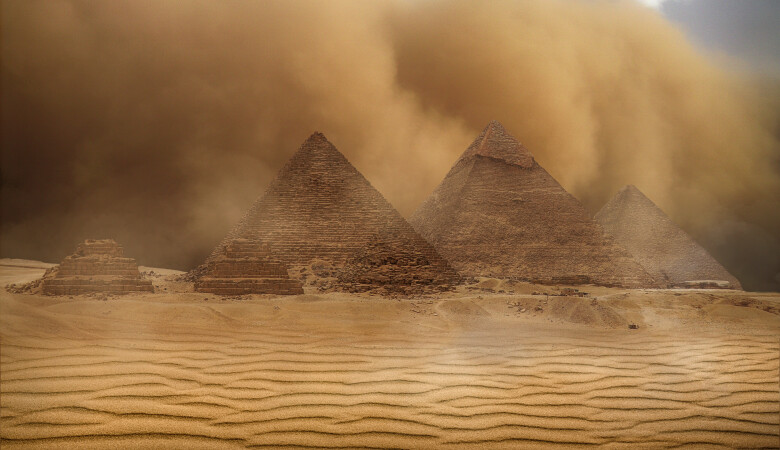God Will Swallow Up Death Forever (Isaiah Sermon 26 of 80)
September 09, 2012 | Andy Davis
Isaiah 25:1-12
Glory of God, God Handing Over Men, Supremacy of Christ
Pastor Andy Davis preaches a verse by verse expository sermon on Isaiah 25:1-12 and how God will eventually eliminate death and all pain.
- Sermon Transcript -
“Faith smells the fragrance, when as yet there is no rose.” I read that on a church sign this morning as I was driving to church, on the Free Will Baptist Church right up the road from us, they have a sign ministry, and some of the signs are good. Some of them. Some of them are just bad puns, I think. But some of them really do point to deeper things and are great encouragement, and this one was, and I thought, “What an incredible introduction even to the sermon that I wanna preach today.” Faith smells the fragrance when as yet there is no rose.
Now, the Book of Isaiah, the prophet Isaiah is a visionary prophet. You just close your eyes, you have any section of Isaiah read and visions just come in your mind. The vision that Isaiah, son of Amos, saw, that's a visionary book. And there are visions that come from Isaiah 25, but for me it was... I think more of a fragrance wafting from this chapter. It was the fragrance of a feast that God is going to spread for us in heaven. And only by faith are we going to catch the full aroma of that feast that's wafting and feel the invitation to sit at banquet table with God in the Kingdom of Heaven and feast with him forever and ever.
So if you have faith in Christ, you can smell that aroma coming from the text, from the banquet today, and that's what I want you to do. I want you to have that faith, to smell the fragrance of that banquet. I think of all the great banquets you've ever had. For me, I think about Thanksgiving when you eat it way too much, and I think about my mom and dad, they both work together, cooking. They're both good cooks, and my father there, he was a chemist, he would wear this white lab coat and working very seriously in the kitchen. I remember the look on his face and just doing an exquisite and very technical job cooking for us. And it was just really well done. And my mom too working and just the aromas of the pies and of the turkey was getting carefully basted and eventually the gravy and all of it just wafting from the kitchen, just makes your mouth water, and I want that to float from the text today because it speaks of a banquet that God is going to spread for us in the kingdom of heaven.
And I want us to see that. This is just an incredible chapter. It's a chapter of celebration. A chapter of joy and celebration. There's lots of judgment chapters in Isaiah. Isaiah 23, the judgment on Tyre and Sidon. Isaiah 24 the judgment on the whole world, the destruction of all the earth, but here in chapter 25, we have rich, full celebration. Celebration, I think ultimately of the resurrection victory of Jesus Christ, and so that's what we get to celebrate today, and I've prayed that God would give me grace to explain how my own heart has been captivated by this text. How for years I have longed to preach Isaiah 25. Now I get one chance to do it. Oh God, give me grace to not mess it up, that I might speak with the joy, the energy, the life that's in my heart that reduced me to tears this morning, and that's gonna be of no use while I'm preaching. So it's gone, thank God for that, but the passion behind it of celebrating the resurrection, victory and the feast that we will have in heaven. That's my desire today.
There are four awesome things that are celebrated in this chapter with incredible clarity. First God's sovereign plan, formed, fashioned before the creation of the world is celebrated in Isaiah 25. Formed in the mind of God, before the creation of the world. Second, God's astonishing power to convert and to transform ruthless nations of tyrants and oppressors, to transform them and convert them, so that they will praise him and submit to him and celebrate his glory. God's power to do that. Third, Jesus's marvelous victory over death and the grave. His power over death is celebrated in this chapter. Fourth, God's terrifying power to bring down nations and individuals who will not yield to his rule, to crush them down to the very dust. These are the great things that Isaiah 25 celebrates. So let's look right away at verses one through five. Praise God.
I. Praise God for converting ruthless nations.
Look at verses one through five. "Oh Lord, you are my God. I will exalt you and praise your name, for in perfect faithfulness, you have done marvelous things. Things planned long ago. You have made the city a heap of rubble, fortified town of ruin. The foreigners strong hold a city no more. It will never be rebuilt. Therefore, strong peoples will honor you, cities of ruthless nations will revere you. you have been a refuge for the poor, refuge for the needy in his distress, a shelter from the storm and a shade from the heat. For the breath of the ruthless is like a storm driving against a wall, and like the heat of the desert. You silence the uproar of foreigners as heat is reduced by the shadow of a cloud. So the song of the ruthless is stilled."
“God does everything for the praise of his glory. Everything he does, he does for the praise of his glory.”
So I begin by just saying this, God does everything for the praise of his glory. Everything he does, he does for the praise of his glory. I love the beginning of Piper's book, 'Let the Nations Be Glad'. A great book on missions. And he says there, "Missions is not the ultimate goal of the church. Worship is. Missions exist because worship doesn't. Worship is ultimate, not missions, because God is ultimate, not man. And when this age is over and the countless millions of the redeemed fall on their faces before the throne of God, missions will be no more. It is a temporary necessity. But worship abides forever."
So God does everything he does so that individual people will praise him for his glory. Ephesians 1 makes this very plain. In Ephesians 1, it says in verses 4-6, "In love, he predestined us to be adopted as his sons through Jesus Christ in accordance with his pleasure and will". Listen to this, "To the praise of His glorious grace". So predestination is for praise. Again, in the same chapter, Ephesians 1 in verse 12, "In order that we, who were the first to hope in Christ, might be for the praise of his glory". And then again in verse 14, speaking of converts, they also converted to the praise of his glory. So that's three times in 10 verses, it speaks of the reason why God does everything, and that is for the praise of his glory. And so Isaiah 25 has a marvelous tone of praise for almighty God, that's why my outline is praise God for this, praise God for that, and praise God for the other. Everything is just celebration in this chapter, just praise him, give him glory. But it must be done by individuals, it's done by people, by individual human beings, and so there's a very individualized personal aspect of praise right from the start here.
Look at verse 1, "O Lord, you are my God; I will exalt you and praise your name, for imperfect faithfulness you have done marvelous things, things planned long ago". Now, Isaiah chapters 13-39, as we've been saying, just shows the sovereign power of Almighty God. The God of Abraham, Isaac, and Jacob over all the earth. He rules over all nations. Rules over Babylon all the way to Assyria. So Isaiah 13, God sovereignty over Babylon is a Isaiah 37, 38, 39, his victory over Syria and in between lots and lots of smaller nations and oracles against them, Arabia, Syria, Damascus, Ethiopia, Egypt, all of these God rules over all of them. Tyre and Sidon, God rules over mighty nations, and we proclaimed and will see in Isaiah 40, how God sits and throne above the circle of the earth, and all the nations before him are like grasshoppers, and the nations are just a drop from the bucket.
So we have this infinite sense of the majesty of God, how great he is, how mighty and how powerful. But we should never lose sight of the fact that God does this so that he might be known individually and personally by people just like you and me. By individual people created in the image of God. That he might have a relationship with us individually. I think this is exactly why Jesus, for the most part, I think, sought to heal people through face-to-face contact though he literally could have cured the whole world of all of its diseases with one word. If he wanted to. But he wanted face-to-face contact like the woman who was bleeding and touched the hem of his garment, he stopped and says, "Okay, who touched me?", he wants that encounter with you, he wants a relationship with you. He wants an intimate relationship. And so it's very, very personal here.
Isaiah makes his love for God personal. "O Lord, you are my God". Can you say that? Can you say that the God of the Bible is your God? Can you speak with that kind of intensity, that kind of personal love? That this God who sits enthroned above the circle of the earth, this one who cups his hand and scoops up the Pacific Ocean, that kind of thing, who weighs the mountains and it balances as though they were dust on the scales. This great God is your God. And you talk to him every day. And you live your life in front of him before him by faith. You get this in Psalm 139, don't you? Where the psalmist David said, "Oh Lord, you have searched me and you know me. You know, when I sit and when I rise, you perceive my thoughts from afar. You discern my going out and my coming back in, you're familiar with all of my ways". And at the end of the Psalm, he says, "Do that, keep doing that. I want you to search me, I want you to know me, I wanna be intimate with you God".
Or again, the apostle Paul in Galatians 2:20, who knew very well that there would be a countless multitude from every tribe and language and people and nation, for whom Jesus died, huge, huge, multitude of people, vast sea of humanity that Jesus shed his blood for. But he gets very, very personal in Galatians 2:20 when he says, "I have been crucified with Christ. And I no longer live but Christ lives in me, and the life I now live in the body, I live by faith in the Son of God who loved me. And gave himself for me." Not loved us and gave himself for us. That's true, that's not what he said there. Loved me, and gave himself for me. Very, very personal. So Isaiah begins this incredible chapter intensely, personally, "Oh God, you are my God, and I will exalt you and I will praise your name". Well, why is he praising Him? What is the reason why Isaiah praises him? Well, he says, "I will exalt you and praise your name for in perfect faithfulness you have done marvelous things, things planned long ago". That's the topic of his praise, that's why he is intensely praising God here.
In his wisdom God, before he said, "Let there be light", had worked out a detailed sovereign plan for the entire history of the human race. It was all worked out before God said, "Let there be light". I mean down to the tiniest detail, down to the sparrow falling to the ground, down to the dice being cast into the lap, and it's every decision coming up the way God wanted. He had it all absolutely, completely worked out. He had figured out what path would be, would tend for his ultimate end in creating the universe, and what was that, that we would all be for the praise of his glory. And so he worked out an ancient plan before the foundation of the world, and now Isaiah is praising God that he's working it out, he's actually doing it. I'm praising you because the plan you thought about before, you said let there be light, you're doing it now it's happening.
It's going on. And so this sovereign plan, which is Isaiah 14, celebrate, Isaiah 14:26-27, this is the planned plan determined for the whole world. This is the hand stretched out over all nations, for the Lord Almighty has purposed and who can thwart him. His hand is stretched out and who can turn it back. Well, the center piece of that sovereign plan is the salvation of the elect from every tribe and language and people and nation. That's the centerpiece of God's plan. Ephesians 1:11, "In him, we were also chosen, having been predestined, according to the plan of Him, who works out everything, in conformity with the purpose of His will. In order that we who are the first and hope first to open Christ might be for the praise of His glory."
So here, Isaiah is astonished by the marvelous things, the wonderful things that God's plan includes. They're like miracles to him. In this particular case, in these verses, he's celebrating the fact that God has the power to turn ruthless, oppressive, tyrannical, empire-building human beings, into meek, humble, lamb-like followers of Jesus. He actually has the power to do that. And that's marvelous, isn't it? It's marvelous. That God has that kind of power to do that. So he's working it out, it says, in perfect faithfulness, he's working out his plan. He knows what He's trying to do, and he is doing it in perfect faithfulness. He's not swerving to the left or to the right. "The Lord Almighty has sworn," Isaiah 14, "Surely as I have planned so it will be, and as I have purposed, so it will stand." Isn't that wonderful? Doesn't that just bring peace to your hearts? "As I have purposed so it will be.” And nothing can stop it. So he's marvelous. God's plan is marvelous. It's a miracle, salvation, former enemies, Gentile nations whose bloody boots tramped the surface of the earth and came down on the necks of cowering people. They are stripped of their pride. Their own walls crumble, and humbled, but still alive, they then turned to the God who struck them and find salvation in Him. It’s marvelous!
“God has the power to turn ruthless, oppressive, tyrannical, empire-building human beings, into meek, humble, lamb-like followers of Jesus”
Praise God for that. So we have here the crushing of the city of rebellion, the city of man, look at verse two, "You have made the city a heap of rubble. The fortified town, a ruin, the foreigners stronghold a city no more. It will never be rebuilt." So this is the crushing of the city of man. Now we come again and again to this concept of the city of man versus the city of God. We have city, city, city, almost every chapter mentions the city, and we're not sure what city it is, so it ends up just kind of floating above and just becoming a symbol for the city of man. What Augustine wrote about in the 5th century as Rome, what the pagans called the eternal city. Jerome thought with the fall of Rome came the end of the world. Well, Jerome, apparently has been wrong by about 16 centuries at least. But he thought, you know, with the fall of Rome, the end of the world was imminent.
Augustine saw a little bit further. He said, "No, this is just another human city that's falling. It's been going on for a long time." Significant moment when Alaric and the Visigoths went running through the streets of Rome burning and looting and doing different things. It was a big moment, no doubt about that. But he wrote City of God at that point to say, "You know what's really going on? Is the advancement of the gospel of Jesus Christ, the building of the City of God, the Eternal City." Charted out before the foundation of the world to evangelism and missions, the advance of the gospel, that's the building of the City of God. City of Man rises and falls.
So as human beings gathered together in one big metropolis and they put walls around them, and they think that those walls make them safe and secure, and they trust in those walls and they trust in their power, and then they do well and their harvests come in and all their needs are met, and they started developing military technology, and they start to move out like a river and conquer unwalled villages and take advantage of weaker peoples and start to build an empire. That's just the City of Man, friends, that's what it is.
And in verse two, God brings it down, brings it down to the ground. He just turns the walls into a pile of rubble. He has the power to do that, and therefore, in this verse, in verse three, it results in conversion. It results in salvation for those tyrants. At the end of the chapter, for some represented by Moab, it's going to result in condemnation, destruction and judgment under the wrath of God, but here it results in salvation for some. Look at verse three, "Therefore, because you have turned the city into a heap of rubble because of that, therefore, people, strong peoples, will honor you. Cities of ruthless nations will revere you." Do you see that? That language is language of worship. These strong peoples will worship the God who did this to them.
This is the story of the world, friends, is the story what God can do. It's a story of the Book of Daniel. It's a story of Belshazzar's feast and Babylon coming down that very night, fallen, fallen is Babylon the great. So God has the power to do that, but in the midst of it, he can save out a remnant even of Babylonian tyrant oppressors, like Nebuchadnezzar, before that, converted, saved. Turned into a humble... I remember how God dealt with him and how he turned his mind from sharp and clear and arrogant and pride filled to that of a beast grazing for seven years. I've often wondered who found him first in that condition, which of his counselors came. Said, "Now we've got some things for you to sign," and he mooed back. Said, "Okay." A year later, they had a cycle of who was going to feed him and water him.
Okay, but at that early stage, I mean, just what has happened to the king? But God had a plan for him, he didn't kill him. He didn't kill him. He kept him alive for seven years, and at the end of the seven years, he converted him. He gave him back, not the mind he had before, a whole different attitude now. Daniel 4:34-35, "At the end of that time, I, Nebuchadnezzar, raised my eyes toward heaven and I praised the God of Heaven. My sanity was restored and I praised the Most High. I honored and glorified Him who lives forever. His dominion is an eternal dominion. His kingdom endures from generation to generation. All the peoples of the earth are regarded as nothing. He does as he pleases with the people, the powers of Heaven, and the peoples of the earth. No one can hold back his hand or say to him, what have you done?"
No, that's a conversion, friends. You can't write those words and not know the saving grace of God. Or again, think of the power of God and transforming a vicious, murderous man, a religious Zealot, like Saul of Tarsus, who's breathing out murderous threats against the Lord's disciples, and going from place to place and dragging off men and women. And throwing them in prison, hardening his heart to their cries. Then he's on the road to Damascus with letters from the high priest to arrest any that he might find there who are followers of Jesus. Then suddenly, suddenly a light, a blinding light, flashed from heaven, and he fell to the ground, and he heard a voice calling his name. Calling him by name, "Saul, Saul, why are you persecuting me?", "Who are you, Lord?" he called back, "You know who I am. [laughter] I am Jesus. I am Jesus, the very one you're persecuting. Now get up and go into the city, and you'll be told what you must do." That's a king giving him orders. And he says later, "I was not disobedient to the heavenly vision." He converted this man, this murderer, this evil man converted, and so examples from church history abound. He did it to the Romans, did it to the Romans, three centuries of the gospel, the gospel taking Rome on and winning. Amen. Winning by martyrdom, by the blood of the martyrs, the seed for the church. The Gospel won. At the end of Rome, the gospel was standing and Rome wasn't. Amen.
And think about the barbarian tribes, think about the Tribes of Germania, think about Boniface the missionary to them. He goes up to the northern woods of Thuringian, and he preaches, and he finds there a sacred oak, the Jupiter Oak, that they're all bowing down in their worshipping, and he says, "Chop it down." Actually, he begins to chop it down himself. Now that's a bold mission work right there. And the people are like, "All right, should we kill him? No, no, let's let Thor kill him or let Jupiter kill him." Well, Thor didn't do it. Actually, what God did is send a mighty, miraculous wind that blew the tree down, that's what the story says. The tree gets knocked down mid-stroke. Takes a long time to chop down an oak tree with an ax, and then Boniface up on the stump and preaches the Gospel of Jesus Christ. Amen. And then builds a church from the wood.
I just love that. But these are violent, militaristic, conquering people that are subdued by the gospel. Think about the Vikings, who go from place to place, coming on their dragon ships, coming out of the mist, and just stealing from monasteries, stealing gold and silver and burning the books, the Bibles, burning them because they meant nothing to them. Give it another century or two, and they are also converted by the gospel. It's awesome, this story. And Isaiah found it awesome, didn't he in this chapter? He says, "I praise you, O God, 'cause you can do this. You can turn mighty conquering people into humble, meek, lowly converts, you can do that. In the meantime, you can also protect your people who are cowering under their oppressive boot." Look at verses four and five, "You have been a refuge for the poor. A refuge for the needy. In his distress, a shelter from the storm and a shade from the heat. For the breath of the ruthless is like a storm driving against a wall, and like the heat of the desert, you silence the uproar of foreigners as heat is reduced by the shadow of a cloud so the song of the ruthless is stilled."
So while the oppressors are in their heyday, an awful lot of innocent people get killed, a lot of innocent people get crushed. And these verses give the promise of refuge and protection for God, for God's people, because for the most part, God's people have been the oppressed. They have been the minority in that society. They have been flotsam and jetsam on the wave of history. We've not been, for the most part, in charge of it, but actually carried along by it. And so the dominators, the animals, the beasts of the earth, have crushed, for the most part, God's people, and sent them to heaven. And many martyrs were made, but in the midst of that, God is a refuge for them, and he protects them from this onslaught, this storm of tyrannical oppression, like the breath, hot breath like a desert wind, beating against the wall, the wall of the city, pushing on it until it falls. And God was the refuge for that.
It's like a storm coming down. I picture like a hailstorm. Last year, I was out in the western part of this state and I was riding my bicycle, a mountain bike, up switchback mountain, a dirt road, and going up. And suddenly the weather got very, very interesting, very interesting. Windy, cloudy, then it got electrical and lots of thunder, lots of lightning, and then came the hail. Now, that's when I got interested. The hail. Little marbles, marbles of ice pelting me. The arms were tough. On my arms, that was bad, but the worst part was the little chunks of ice that got in the cracks of my helmet and stayed there and gave me a brain freeze. You know what I'm saying? They just melted in these cracks and it was awful, but I'm getting pelted, so there's only one thing I wanted in that moment, one thing, I wanted refuge. I wanted refuge. I was looking, and I couldn't find it, actually, I couldn't find any place that wasn't getting pelted. Leaves, shredded leaves, were all over the place by this pelting hailstorm.
So I said, "The best thing for me to just go down the mountain." I started riding, it was one of the hardest rides of my life looking for shelter. These verses, verses four and five, talk about how God is a shelter for his defenseless people in the midst of the onslaught of this tyranny. So, verses one through five, Isaiah celebrates God's sovereign power as ruthless, tyrannical, empire builders tromp on the earth, and how God eventually brings some of them low, and saves them, and converts them. But you know there's a more powerful enemy even than these tyrant oppressors. And verses six through nine deal with that one directly, and that's the enemy of death. What 1 Corinthians 15 calls the final enemy. There has been no enemy of God's people that has been as cold-hearted and ruthless as this enemy, death. Death cares nothing for human affections, cares nothing for the age of its victims, for the marital status of them, how long the couple's been married, cares nothing for that. Cold-hearted tyrant. That's death. Cold-hearted tyrant, and an enemy in 1 Corinthians 15.
II. Praise God for Spreading a Feast by Swallowing Up Death Forever!
In verses, six through nine celebrates, praise of God for death destruction. That's what it's all about. Praise God for death being swallowed up in victory. Look at verses six through nine, "On this mountain, the Lord Almighty will prepare a banquet, or feast of rich foods, for all peoples, a banquet of aged wine, the best of meats and the finest of wines. On this mountain, he will destroy the shroud that enfolds all peoples. The sheet that covers all nations. He will swallow up death forever. The sovereign Lord will wipe away the tears from all faces. He will remove the disgrace of his people from all the earth. The Lord has spoken." In verse nine, "In that day, they will say, behold, this is our God, we trusted in him and he saved us. This is the Lord, we trusted in him, let us rejoice and be glad in his salvation." These are some of the sweetest verses in the Book of Isaiah for me. When I went through this book and was memorizing years ago, this chapter arrested me because I'd never seen it before, I never noticed these verses before. But the apostle Paul noticed them and took a phrase and put it over in 1 Corinthians 15. We'll talk about that in a minute.
But let's talk about this banquet. Let's talk about this feast that the Lord Almighty will spread. How is it described? There's just lush language for this banquet, it's a feast of rich foods. It's a banquet of aged wine. The best of meats and the finest of wines, the NIV gives us. That's a good translation. It's just the highest quality experience you can ever have at a banquet, and this is where I desire that in some way, this message could be the aroma of life unto life for you. That you could just smell this banquet, the sweetness of the aroma wafting from God's table. It's a rich banquet.
Now scripture portrays a number of rich feasts. Many people in the world never get to sit at a rich feast or banquet. They're poor and so they never have that experience, maybe. And so there are stories in the Bible of rich feasts that are spread and you can read about it at least... Or use your imagination to think about what that's like. For example, 1 Kings 10, King Solomon puts on a banquet for the Queen of Sheba. Remember that one? She came from the ends of the earth to listen to Solomon's wisdom. And when the Queen of Sheba saw all the wisdom of Solomon, and the palace that he had built, and the food on his table, the seating of his officials, his attending servants in their robes, and his cupbearers and the burnt offerings he made at the temple of the Lord, it says literally, there was no breath left in her. Her breath was taken away.
Well, friends, this banquet will be better than Solomon's banquet, amen. As Jesus would say, "And now a banquet greater than Solomon's is here." Or again you get the same thing in Esther chapter 1, where King Xerxes opens up the splendor of the empire from Kush, that's Ethiopia, all the way to India, 120 provinces, for 180 days, and just shows the glory of his kingdom, and it culminates in a seven-day banquet described in Esther chapter 1. "The king gave a banquet lasting seven days in the enclosed garden of the king's palace for all the people, from the least to the greatest who are in the citadel of Susa." That's the picture of heaven, is the picture of the new Jerusalem. Everybody from the least of the greatest will sit at the King's table.
"The garden had hangings of white and blue linen fastened with cords of white linen and purple material to silver rings on marble pillars. There were couches of gold and silver on a mosaic pavement of porphyry, marble, mother-of-pearl, and other costly stones. Wine was served in goblets of gold, and each one was different from the other, and the royal wine was abundant in keeping with the king's liberality. And by the king's command, each guest was allowed to drink in his own way, for the king instructed all the wine stewards to serve each man as he wished." It's just a foretaste of heaven, that language. So these are rich banquets, but this feast of Isaiah 25 is infinitely greater than any of those.
All right, where is the location of the banquet? Where is God going to prepare it? Well, the text says, "On this mountain, he will do it." Well, what is this mountain? I think to go to the very end of chapter 24, the last verse, right before 25, and I think we get the mountain described. Isaiah 24:23, it says, "The moon will be abashed and the sun ashamed, for the Lord Almighty will reign on Mount Zion and in Jerusalem and before its elders gloriously." So that's the end of the world, as I say, because chapter 24 is talking about the destruction of all the earth. And so Mount Zion... What is Mount Zion? I've thought a lot about Mount Zion over the last year. And I just continue to evolve in my understanding of it. The way I understand it is Mount Zion is the place where God dwells in the midst of his people. And the symbolic aspect of that is the Shekinah Glory of God, the glory cloud descending and staying in the tabernacle or the temple as a symbol of God dwelling in the midst of his people. It came to represent, for the most part, Jerusalem, the city of God, the city as he dwelt among men. It isn't just where God dwells like up in heaven, but it's where God dwells with people.
And so it came to kind of be synonymous for Jerusalem. And so Mount Zion was the mountain on which Jerusalem was built. But ultimately, theologically, the place where God Almighty dwells amongst his people. And so on this mountain, I think, refers to Jerusalem, first and foremost. So on this mountain, what we know as Mount Zion, there he will spread a feast. Friends, it's the same mountain where Jesus died. It's the same mountain where God told Abraham to take his son, Isaac, and offer him as a burnt offering, Mount Moriah. The same place where David at the end of the plague, built the temple, wanted to build the temple on the threshing floor of Araunah the Jebusite. On that mountain, on that place, death will be defeated. That's where it's going to happen. On this mountain, he will spread this banquet, this very same place.
Okay, well, the feast is described. The one who spreads it is God Almighty. The location is Mount Zion and that will be fulfilled ultimately, when the new Jerusalem comes down, like a bride beautifully dressed for her husband, and it's all going to be together, the new Jerusalem there we will dwell, and that's where the feast ultimately will be. Well, who's invited? Who's going to come? Well, here we see the guests are all peoples. Do you see that? People from every nation and tribe are invited. This is very, very plain in the text, 25:6, it says, "On this mountain, the Lord Almighty will prepare a feast of rich food for all peoples." Do you see that? Verse seven, "On this mountain, he will destroy the shroud that enfolds all peoples, the sheet that covers all nations."
Verse eight, "The sovereign Lord will wipe away the tears from all faces. He will remove the disgrace of his people, his people, from all the earth." Friends, these are the elect from every tribe and language and people and nations who are invited to this banquet. That's who's coming. This is universal language. A wide reach; the wide reach of this feast. Jesus spoke of it in Matthew chapter 8, in verse 11, "I tell you that many will come from the east and the west and will take their places at the feast with Abraham, Isaac, and Jacob in the Kingdom of Heaven”.
Jesus spoke about it again, on the night before he was crucified. He said, "I tell you, I'll not drink this fruit of the vine until that day when I drink and drink it anew with you in my Father's Kingdom," when we sit down and we have that feast of the best of meats and the finest of wines. Now, I wrote in my outline here, the center of the banquet: "The swallowing up of death forever." I've changed, this morning I changed. Okay. An important feature of the banquet is the swallowing up of death forever. Center is another place. We'll get to that at verse nine. But an important feature of this banquet is the swallowing up of death forever. Death is portrayed as the enemy of all peoples of all nations. All of us descended from Adam are under the death penalty. In Adam, when Adam sinned at the Tree of the Knowledge of Good and Evil when he took that fruit and ate, we all sinned. Romans 5 says that. And in him, his death penalty came on us all, so every human infant born, is born seen to be a sinner in God's sight, and under the death penalty. It's universal.
Sin reigns in death like a cold-hearted tyrant. It's personified there in Romans 5:21, "Sin reigns in death." And so there's this link between sin and death. And Isaiah depicts it as a shroud that covers all people, a sheet that enfolds all nations. You get the picture of a quiet, like a corpse laid out on a slab, like in a morgue. In a movie, when they're working, working, then they just pause and then they pull the sheet over the face. You know what that means. You know what that means. Person's dead. There's nothing more to do. Go by an accident, if you were to see somebody completely covered up, you know. They're not scrambling, they're not trying to get them to the hospital. There's nothing more to be done.
So death is the shroud. It's the sheet. And it's universal. It's a universal threat. People in China, people in Indonesia, people in Australia, people in Africa, people here in North America, rich, poor, it's everywhere. It's a shroud that enfolds all peoples. And the sovereign Lord is going to destroy it. And it speaks specifically here of the sorrow of death and the disgrace of death. Look at verse eight, "The sovereign Lord will wipe away the tears from all faces. He will remove the disgrace of his people from all the earth." So death with its ability to destroy our bodies through aging and corruption and decay, and then when you die, when you stop breathing, then the microbes take over and the worms take over and the parasites take over. And it's disgusting. And so it was said to Jesus, if we open the door, there'll be a bad odor, for corruption has taken over. There is a dishonor in this. There is a disgrace in death, and you feel it when you go to the ICU and people are strapped to machines and they can't breathe, except with a machine. There's a disgrace, a dishonor to it. And so it says here in the verse, "He will remove the disgrace of His people." He'll take away their disgrace. So it says in 1 Corinthians 15, "The body that is sown is perishable, it is raised imperishable." It is sown in dishonor.
No matter what you do at a funeral, no matter what you do at the grave side, there's still an inherent dishonor in it. It is sown in dishonor, it is raised in glory. It is sown in weakness, it is raised in power. How does God do this? He does it through Jesus. I wrote at the top of the sheet, preach Jesus right now. Don't preach Isaiah, preach Jesus. Through Jesus's shed blood on the cross, by him taking our penalty for our sins and by his death under the wrath of God, by his justifying work and by his mighty resurrection, he does this conquering, this conquest, this swallowing up of death. That's how it happens.
“It is sown in dishonor, it is raised in glory...Through Jesus's shed blood on the cross, by him taking our penalty for our sins and by his death under the wrath of God, by his justifying work and by his mighty resurrection, he does this swallowing up of death.”
To Jesus be the glory. And I love how it says he will swallow up death forever. Isn't that sweet? This isn't just a victory. There's some close victories, like eking out a victory by a one point. A buzzer beater. You know what I'm saying? Friends, this isn't a buzzer beater here. This is a trouncing. He is going to swallow up death forever. I picture here, Moses with his... remember his staff. And He says, "Throw it on the ground Moses," turns into a serpent. Right? Says, "Show that to Pharaoh." Remember what happened when he did that, you remember? So he throws it down and much to his chagrin, the magicians did the same thing. It's like, "Oh, I didn't know they could do that here in Egypt. God, what were you doing? I thought it was gonna be something impressive.", "Just be quiet and watch." So watch what happens, and Moses' snake swallowed up the wicked snakes of the oppressors. Swallowed it up. And so there was a little bit of mocking and it was silenced when that happened, and then he grabs the end of the tail and it turns into a staff again. Swallowed up.
It's awesome. So death will be crushed. Final score, final score, millions from every tribe, language, people, and nation to zero per death. Millions to zero. Because death will not say anything final over you or me. Amen. Death itself is gonna be thrown into the lake of fire, and I will live. And I will eat with God, and I will see his new heaven, new earth, and death will be a distant memory. And so Paul picks up on this in 1 Corinthians 15, and he says, "Then the saying that is written will come true, death has been swallowed up in victory. Where o death is your victory, where o death is your sting?" He starts to mock death. "What happened to you, o death? You were so powerful once. Look at you now. The sting of death is sin. And the power of sin is the law, but thanks be to God, he gives us the victory through Jesus Christ." And those words move me again, melted me, he gives us the victory. Jesus wins it, and then he says, here, you just sit down and eat my victory. Enjoy forever.
So death is gonna get swallowed up in the lake of fire. I picture here, like the Lord of the Rings, you guys remember the ring of power? If you don't know this, just tune out for the next minute with this illustration and then read the books, okay? Or watch the movies. But this ring of power represents the power of wickedness and evil and sin in the world, and it's all kind of into this ring, and the whole quest of the whole thing, three books, hours and hours, nine, 10 hours of movie-ness, and there's this ring. And then finally it gets thrown into the cracks of doom and this molten lava at the bottom, and you remember what happens? It just melts. And the whole evil kingdom of Mordor just comes crumbling down, like at the end of this chapter, just crumbling down, just reduced to nothing.
Death is gonna get melted and swallowed up in the lake of fire. And so in Revelation 20:14, then death and hades are thrown in the lake of fire. And this is all done by Jesus. Jesus gives us the victory. All you have to do is repent, believe, trust, and he will be for you your resurrection victory. He will call to you out of the grave and you'll come out in a resurrection body and you will live forever. And so Isaiah 25:6-9, is predicting the awesome victory celebration at the end of the world. And verse eight, the very end, it says, "This is as certain as the Word of God." What it was the final phrase there, a final thing in verse eight: "The Lord has spoken." That just brings goosebumps to me. God's gonna do this. He's gonna do it. And nothing's gonna stop it.
And then what's gonna happen after that? Verse nine, then they're gonna praise. They're gonna praise and praise and praise forever. They will say, "Behold our God, behold our God. We trusted in him and he saved us. This is the Lord. We trusted in him, let us rejoice and be glad in his salvation." That is the center of the feast, and actually it's not even the center of the feast. Friends, it is the feast, every dish brought in and laid down is God. His attributes, his achievements in history, what he did for this brother and that sister, that man, and this little girl throughout history, what he has done will be the feast. God's creativity in the new heaven and the new earth, his gentleness, his power, his wisdom, that'll be the feast one dish after another, set before you and we will eat. God is the feast. God is the reward, God is the inheritance. He's what you get.
"Come you who are blessed by my Father, take your inheritance, the kingdom prepared for you since the creation of the world." Is it heresy to change it a little bit and say, "Come you who are blessed by my Father, take your inheritance, the king." He is the inheritance. He's what we get, we get Jesus, we get the greatness of God forever. And so, as Steve Green put it in God and God Alone, he said, "God and God alone will be the joy of our eternal home. He will be our one desire, our hearts will never tire of God and God alone, he will be the feast."
III. Praise God for Condemning Arrogant Nations!
In the meantime, brothers and sisters around the world, they're suffering, verses 10 through 12. It's not the way I would have ended the chapter, I put great stuff at the end, you know. Chapters 10 through 12 talk about the judgment of those who will not submit to this message, represented by Moab: "The hand of the Lord will rest on this mountain, but Moab will be trampled under him as straw is trampled down in the manure. They will spread out their hands in it as a swimmer spreads out his hands to swim and God will bring down their pride despite the cleverness of their hands. He will bring down your high fortified cities or walls and lay them down. He will bring them down to the ground to the very dust."
This is God's wrath against arrogant unbelievers who will not submit. And at the beginning of the chapter, they get converted, these folks don't. The Bible doesn't teach universalism. Not everyone will sit at this banquet table. There are some rebels who will not yield, they will not bow the knee to King Jesus, represented by Moab here, but I think it's just all the reprobates, the ones who will not yield, who will not submit. And all of the language here is downward, they're gonna be trampled down, their pride is gonna be brought down, their walls are gonna be hurled down. It's all downward language.
And no matter what they do with their clever schemes and their self-salvation schemes, they can't escape this judgment. And God will judge them. And so Jesus said, "Do not fear those who kill the body, and after that, there's nothing more they can do to you. I'll tell you who to fear: Fear the one who after the death of the body has power to destroy both soul and body in hell." The ultimate downward pressing under the judgment of God is in the lake of fire, it's in hell, and so the scripture warns us to flee the wrath to come, and to come to Christ.
IV. Applications
So for our application, can I just invite you to the banquet. Just come, alright? Matthew 22, the message is going out, the king's messengers are on the roads right now, they're out there and they're telling everyone in the world. The wedding banquet of the King and his son has come. The King has prepared the banquet, the oxen and fattened cattle have been butchered and everything is ready. Come to the banquet. But in that parable, they paid no attention to, went off. One to his field, another to his business. Don't do that, come to Christ. Don't leave here unregenerate, don't leave here not sure if you're gonna sit at the table. All you have to do is look to Jesus and say, I'm a sinner, I need to be saved. Save me, you shed your blood for sinners like me, you rose again from the dead. Save me. It's all. And if you believed in Jesus years ago, you still believe in Him, but you're drifting, you're struggling, you're sorrowful, like in that song, there's misery and sadness, go to the empty tomb, look in it again, and feast. Say, Lord, would it be possible for a few extra morsels to fall from your eternal table down into my open mouth today? Can I get some foretaste of heavenly joy today?
Ask him for a down payment. A deposit from the Holy Spirit. Give me some heavenly feasting joy right now. Banqueting joy, give it to me. I'm depressed, I'm discouraged, I'm downtrodden by my sins, I'm feeling guilty. Would you please give me a foretaste of your mercy and your grace? Come to the banquet. And just celebrate. Just go home happy. Go home happy. Just be happy in Jesus. No long faces. I'm looking at you now. No long faces. If you're a Christian you should be happy. It's like, “Well, I don't have to be happy in front of the pastor.” No, that's... But some time today be happy. Okay, sometime today. Smile. Alright, don't do it for me 'cause you don't wanna... Fine, I get it. Just out of pride, I'm like that. When preachers tell me to do things, I tend to not do them. I want you to raise your hands, I'm not raising my hands, I'm not doing that. I'm not gonna do what I'm told here. But I'm just urging you. Be happy. Just ask the question, “Has Jesus done enough at the cross and the empty tomb to make you happy today?”
Be happy then. Praise Him, praise God for his ability to convert people. Pray for unconverted oppressors. We live in a perilous time in our nation when people are voting God in and out, in and out. Sharing, booing God. Its sickening. Don't get angry, pray for people, pray for people who do those kinds of things. Pray that God would convert them. Don't you want them there at the banquet table with you? Pray for them, for our president, pray for other leaders, pray for them that they would sit at the banquet with Jesus and just wait on the Lord, wait for him. It says, "Surely this is our God, we waited for him". There's a lot of waiting. It's not just Larry in Atlanta waiting for Andy to get healed. We're all waiting, doing a lot of waiting. We're not freed from death, that's the final enemy, so we're gonna have to go to some funerals, we're gonna have to go through some suffering. And we need to wait on Him, but in the midst of that, let's rejoice at this resurrection victory. Close with me in prayer.
Father, thank you for the things we've studied today, thank you for the joy that comes from it. Thank you for the delight in this chapter 25, potent, potent verses. Thank you for destroying the shroud that covered my face, taking that shroud off my face and saying, “No, you'll live, you're not gonna die. You will live and not die.” Thank you for saving me. Thank you for saving these brothers and sisters that are sharing this joy with me today, and those that aren't... That are in this room, that aren't sharing the joy right now, because they're unconverted. Oh God, speak to them now. Save them, please. We pray this in Jesus name, amen.































